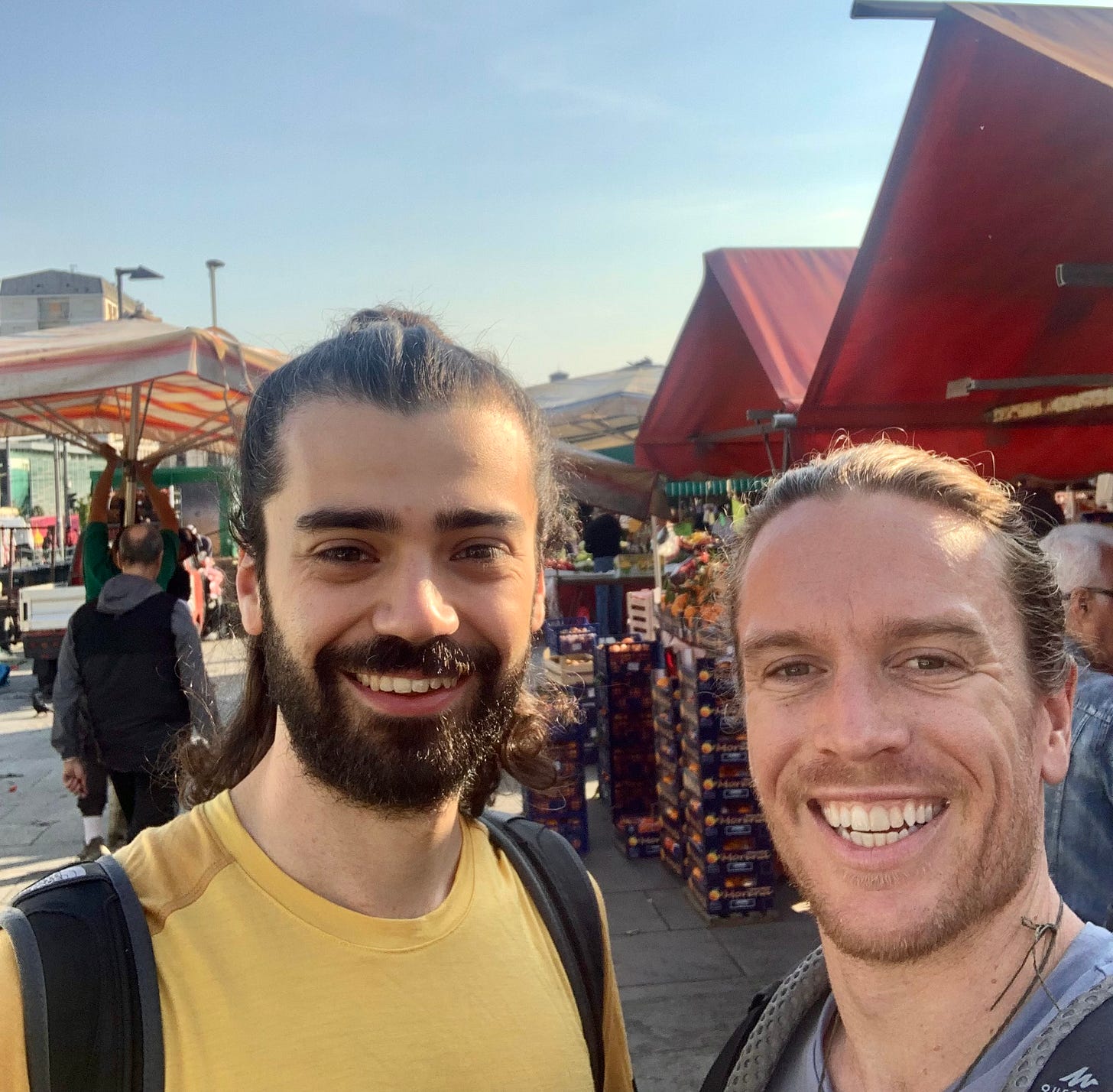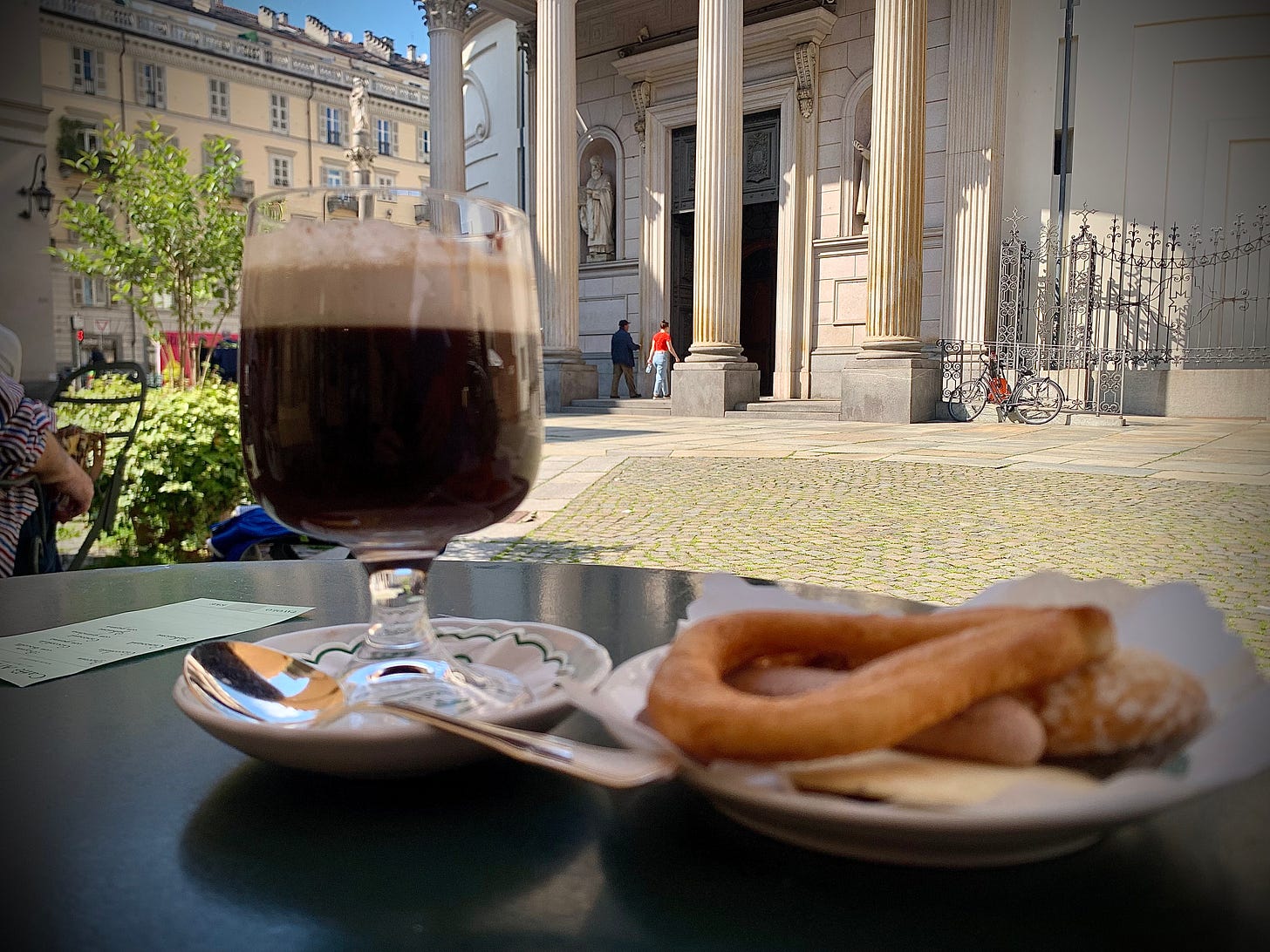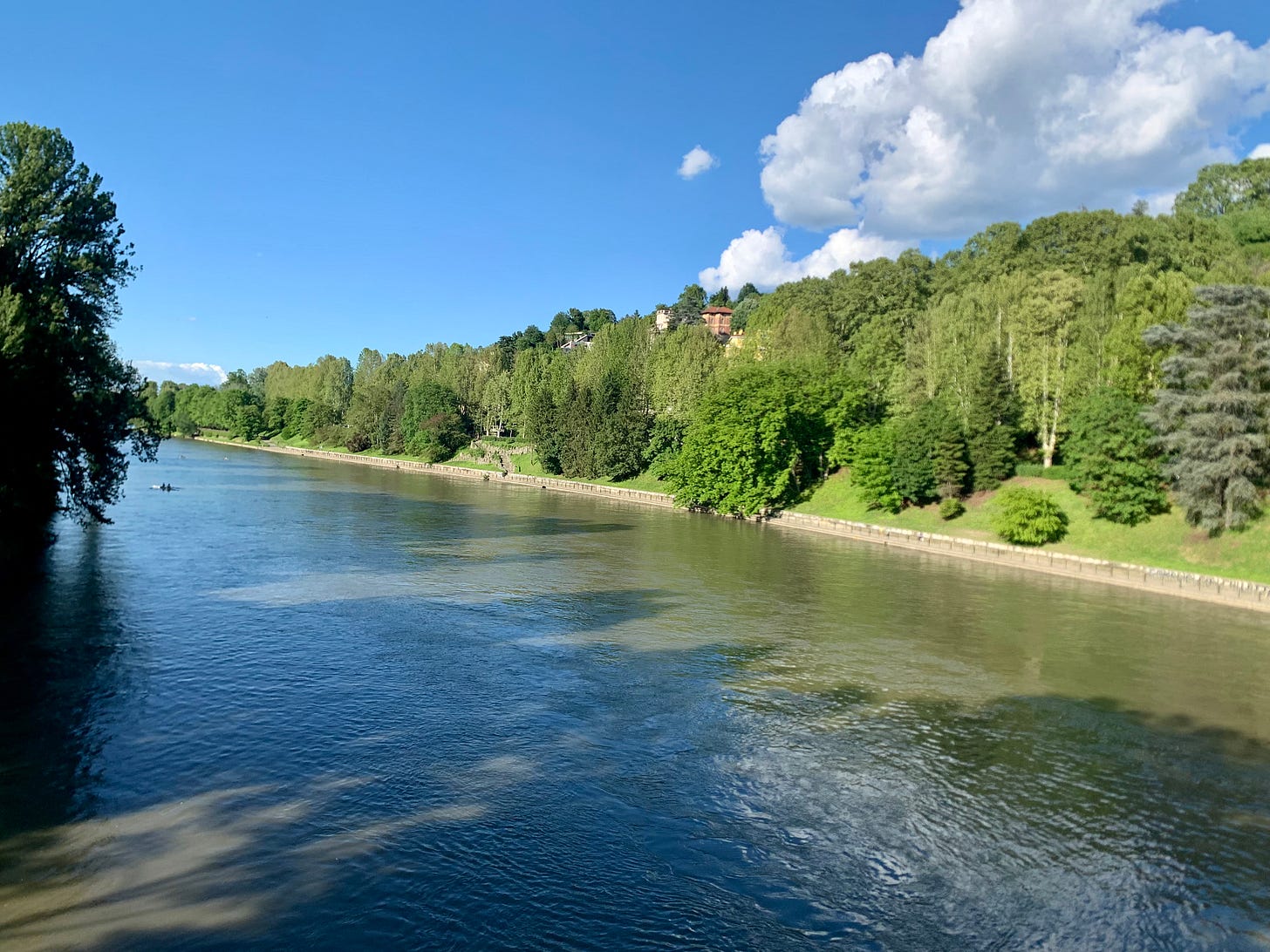Turin’s Cuisine, Parks, and Divinity
The External Journey & An Interview with Turin Local, Andrea Baggio
Welcome to Born Without Borders, the newsletter for nomads, expats, third-culture kids, the travel-curious, or anyone who feels inescapably foreign. I’m currently on a quest to the North of Sweden to explore the therapeutic effects of slow travel and to keep from going any more insane than I already am.
My first stop was Turin, Italy, where my Couchsurfing host, Andrea Baggio, turned out to be the best local guide I could ask for.
For those of you who don’t follow me on Notes, let me catch you up visually. If you’re here for the words, scroll down to where it says “Interview.”
After the market, we went to Sacra di San Michele (an abbey built between 983 and 987 on the top of Mount Pirchiriano, 40 km from Turin), which falls on The Saint Michael's Line, a postulated line connecting monasteries and other sacred sites from Israel to Ireland.

However, I don’t pay for anything Catholic since I know they have enough wealth. Instead, I sat outside and enjoyed the views while I ate a € 10 picnic full of local cheeses, meats, and Caponata (eggplant, tomato, celery, capers, onions, honey, and olives boiled together into heavenly goodness).
Interview
What makes Turin stand apart from the rest of Italy?
The history. Turin was the capital of the kingdom, from which started the union of Italy as a united state. This peculiarity is evident in many things, even the "subculture" and soul of the city.
The city has a double soul: industrial and historical. On one side, there’s the lingering presence of FIAT and its strongly industrialized network. On the other side, there’s the beauty of the ancient buildings from the Roman, Medieval, and Baroque eras.
There’s also a strong tradition of what we define as "social saints." In Turin, a great number of people (both lay people and clerics) grew up and founded or promoted actions in support of the poor. The most famous are Saint Giovanni Bosco and Saint Cottolengo.
In the church where I grew up, there was Pier Giorgio Frassati. Another huge example of this type is Sermig (founded by Ernesto Olivero), which is more recent.
What are your 3 favourite things to do in Turin?
I love buying food and going around the farmer's market of Porta Palazzo. I usually buy a beer (gluten-free because I'm celiac) and something to eat.
I also bring a self-made aperitivo in one of the parks in Torino's hills, overlooking the mountains.
At night, I just take my bike out for a random cruise because the streets are empty.
What are your favourite meals or restaurants from Turin?
I don't have a favourite place to eat (I like exploring).
However, my favourite Piedmontese traditional foods are vital tonnè (sliced veal covered with a creamy, mayonnaise-like sauce flavoured with tuna), ravioli del plin al sugo Barroso (roasted meat ravioli), and battuta di Fassa (beef tartare from Fassona cows). Yes, the type of cow makes all the difference.
I also asked my friend Monica about her favourite Piedmontese meal and restaurant in Torino.
Meal: Agnolotti (stuffed pasta made with small pieces of flattened dough folded over a filling of roasted meat or vegetables).
Restaurant: Piola da Cianci, which their restaurant describes as “Difficile spiegare in poche righe undici anni di Cianci: potremmo riassumerlo con il famoso slogan “per molti ma non per tutti”. It is difficult to explain eleven years of Cianci in a few lines: we could summarize it with the famous slogan "for many but not for all".
What's the greatest challenge of living in Turin?
To discover everything Turin has to offer. Generally, becoming familiar with the people from Turin is not that simple. After you get to know them, they will be super welcoming and nice. I don’t know how to explain it better. There are so many events or places (e.g., clubs) that remain in the shadows.
Here’s a Jazz Club I highly recommend.
How much money does one need to live comfortably?
Rents are 300/400 €/month for a room in a shared apartment, 500/650€ for a double room flat, and 800/1000€ for a small family flat (3/4 people). Of course, it depends on the neighbourhood. These are a range of low prices for an area not so far from the city center.
I generally spend 150 €/month on food. If you eat outside, you can find meals as low as 7-10 €, but 20-25 € is more common. A pint is 3.50 € to 5 €.
What's your favourite piece of history?
It's not my absolute favourite, but among my favourites, it is not so well known—Pietro Micca's story. Basically, he sacrificed his life to protect the city of Turin from the invasion of France.
My friend Monica recommended Café del Bicerin, where Bicerin, the famous Torino coffee with chocolate and whipping cream, was invented.
With the €9 I paid for coffee and biscuits, I could have eaten a giant bowl of fresh pasta, but the setting was well worth it.
Is there any stereotype or misconception you wish to break about Turin?
It is a grey industrial city.
I also heard about this stereotype, which made no sense to me.
What parts of you feel like a person from Turin?
It is said that people from Turin are false and kind. I feel I'm kind. And I feel the soul of the "social saints" I mentioned before.
What parts of you don't feel like a person from Turin?
I don't relate to the closed mentality some people have here. There’s also the snob judgment some of "us" have—a sort of heredity from the nobility around the former kingdom of Savoia, of which Turin was the capital.
What would you change about the city or culture if you were mayor, and/or what do you hope will never change?
I would change the mobility. There are too many cars. It’s not a city for pedestrians, although it easily could be. And I would move the soul of the city from “tourist and industrial” to a city for young people and students. It could bring an impulse for innovation (which already exists a little bit) and cultural progress.
I’ll ask these interview questions throughout my trip to the North of Sweden. Let me know in the comments if there’s anything else you want to know from the local people.
If you’d like to support Born Without Borders and find value in my work, consider becoming a paid subscriber. Paid subscriptions give me more time to research and write my best work. You can also support me through Buy Me a Coffee.
At the end of every journey, I write a book. My first one, Living with the In-Laws, is available on Amazon. Paid subscribers get a free Kindle or PDF edition, and founding members get a signed paperback.
What you might have missed.
About Born Without Borders
Salir de las fronteras que impone tu mente. Who is Born Without Borders for? Anyone caught between cultures or ready to step outside their comfort zone with a quest. It’s for those who feel as inescapably foreign as I do. What do you get for subscribing?












Thanks for introducing me to Turin! Never gave it much thought before and really enjoyed it.
Your article made me add Torino as a place to explore during my next trip to Europe.It's interesting to see the places your local host took you and his explanation about the local food and the city.I cannot wait to vist the market and taste all those local dishes.Great article!